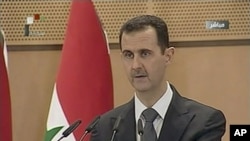U.S. officials say the international community, and more importantly the Syrian people, are growing weary of the Syrian leader’s promises and that what is needed are reforms and an end to what was called here Mr. Assad's “repulsive” crackdown on dissent.
In his third address since Syrian pro-democracy protests began four months ago, President Assad said he would invite 100 leading Syrian personalities to discuss constitutional reforms, with a one-month target for recommendations.
The Obama administration has called on the Syrian leader to enact reforms or step aside.
State Department Spokeswoman Victoria Nuland said what is important now is “action, not words.” She dismissed the Syrian leader’s suggestion that foreigners were largely behind the weeks of violence by security forces that has killed some 1,400 people.
“He spends a lot of time blaming foreign instigators, rather than appreciating that his own people are simply disgusted by a regime that supports itself through repression, corruption and fear," said Nuland. "We’d also note that the vast majority of those innocents killed in Syria were at the hands of security forces.”
Nuland said the interference the United States is concerned about in Syria is by Iran, and that the Assad government has “taken a page from the Iranian playbook” in crushing popular protests as Tehran did after disputed elections in 2009.
The European Union also expressed disappointment with Mr. Assad's speech and said it is preparing to expand its sanctions on Syria in response to the worsening violence.
The State Department's Victoria Nuland hinted of further U.S. sanctions, saying that Obama administration officials are working with U.S. allies on collecting data that might lead to war crimes prosecution of the Syrian leadership by the International Criminal Court, or ICC. She confirmed comments by unnamed U.S. officials last week that the United States is examining possible sanctions on Syria’s oil and gas industry.
Syrian oil production has declined in recent years, but its exports of nearly 400,000 barrels of oil per day are a major source of revenue for the government, especially with trade and tourism plunging because of the unrest.
Syria expert and journalist Andrew Tabler, a visiting scholar at The Washington Institute for Near East Policy, says oil sanctions are more feasible than ICC action.
“They can lead an effort to target Syrian energy, which accounts for about a third of revenues for Syria. It accrues directly to the state. It wouldn’t hurt the Syrian people," said Tabler. "Pulling that off is hard without allies. But other allies in Europe and the Turks are on our side. The ICC indictment, because Syria is not a signatory, would require U.N. Security Council action."
Tabler added that "so far, the Russians and the Chinese have blocked Security Council operations. That doesn’t mean it couldn’t happen in the future, though,” he said.
The State Department said U.S. ambassador to Syria Robert Ford traveled to northern Syria on Monday to try to get a first hand look at conditions in the area, where action by security forces has displaced thousands of civilians, many of whom have fled into Turkey.
Officials here say the U.S. envoy lately has been denied high-level meetings with government officials in Damascus, but has opened dialogue with a wide range of Syrian opposition figures.




